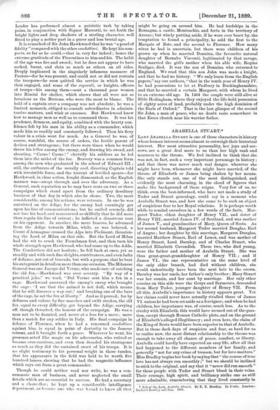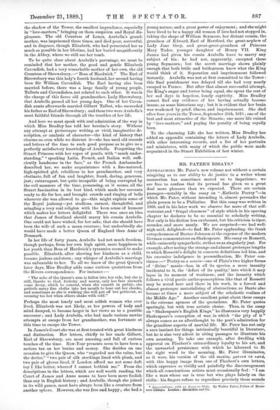ARABELLA STUART.* LADY ARABELLA STUART is one of those characters
in history whose human interest seems almost to outweigh their historical interest. Her most attractive personality, her joys and sor- rows, are a great deal more to us than her high rank and nearness to the throne. We feel inclined to think that she was not, in fact, such a very important personage in history ; and that there was never much real danger, wherever she might have been, whomever she might have married, of the throne of Elizabeth or James being shaken by her means. She only stands out, one of the most distinguished, and evidently the most charming, in the cloud of figures that make the background of these reigns. Very few of us, we think, even the best-informed, who have not made a study of Tudor and Stuart genealogy, could say in a moment who Arabella Stuart was, and how she came to be such an object of suspicious fear to her Royal relations. It is perhaps worth while to remind ourselves in a few words of the facts. Mar- garet Tudor, eldest daughter of Henry VII., and sister of Henry VIII., married James IV. of Scotland, and was mother of James V., and grandmother of Mary, Queen of Scots. As her second husband, Margaret Tudor married Douglas, Earl of Angus ; her daughter by this marriage, Margaret Douglas, married Matthew Stuart, Earl of Lenox, and was mother of Henry Stuart, Lord Darnley, and of Charles Stuart, who married Elizabeth Cavendish. These two, who died young, were the father and mother of Arabella Stuart. She was thus great-great-granddaughter of Henry VII.; and if James VI., the one representative on the same level of the only elder branch, had died without children, she would undoubtedly have been the next heir to the crown. Darnley was her uncle, her father's only brother ; Mary Stuart was her cousin, and her aunt by marriage. Her only other cousins on this side were the Greys and Seymours, descended from Mary Tudor, younger daughter of Henry VII. From all this, Arabella's importance in history appears great. Yet her claims could never have actually rivalled those of James TT. unless be had been set aside as a foreigner; and when he had children, her importance was, of course, much less. As to the rivalry with Elizabeth, this would have seemed out of the ques- tion, except through Roman Catholic plots, and on the ground of Elizabeth's alleged illegitimacy; and even here, the claim of the King of Scots would have been superior to that of Arabella. But in those dark days of suspicion and fear, so hard for us to realise now, the most distant relationship to the throne was enough to take away all chance of peace, comfort, or liberty. Arabella could hardly have expected an easy life, after all that had happened to the different members of her family, and generally "not for any crime of treason, but for love-matters." Miss Bradley begins her book by saying that " the course of true love has not always run smoothly ;" but we should be inclined to stick to the original, and say that it "never did run smooth" for these people with Tudor and Stuart blood in their veins. Their courage, high spirit, and brilliancy strike one as still more admirable, remembering that they lived constantly in
* Life of the Lady Arabella Stuart. By E. T. Bradley. In 2 vols. London Richard Bentley awl Son. 1859. the shadow of the Tower, the smallest imprudence, especially in"love-matters," bringing on them suspicion and Royal dis-
pleasure. The old Countess of Lenox, Arabella's grand- mother, was imprisoned three times, and died poor, sorrowful, and in disgrace, though Elizabeth, who had persecuted her as much as possible in her lifetime, had her buried magnificently in the Abbey, where we still see her tomb.
To be quite clear about Arabella's parentage, we must be reminded that her mother, the good and gentle Elizabeth Cavendish, had a very remarkable mother of her own, the old Countess of Shrewsbury,—" Bess of Hardwick." The Earl of Shrewsbury was this lady's fourth husband, her second having been Sir William Cavendish. The Earl having also been married before, there was a large family of young people, Talbots and Cavendishes, not related to each other. It was in the charge of this fierce old grandmother, Lady Shrewsbury, that Arabella passed all her young days. One of her Caven- dish aunts afterwards married Gilbert Talbot, who succeeded his father as Earl of Shrewsbury; and these two were Arabella's most faithful friends through all the troubles of her life.
And here we must speak with real admiration of the way in which Miss Bradley has told her heroine's story. Without any attempt at picturesque writing, or vivid, imaginative de- scription, or analysis of character—the kind of history that charms us even while we distrust it—she has used old records and letters of the time to such good purpose as to give us a perfectly satisfactory knowledge of Arabella. Forgetting the Stuart Princess with her ropes of pearls, with "much under- standing," "speaking Latin, French, and Italian well, suffi- ciently handsome in the face," as the French Ambassador described her, we make acquaintance with a fine-natured, high-spirited girl, rebellious to her grandmother, and very obstinate, full of fun and laughter, frank, daring, generous, just; extravagant, but quite incapable of being corrupted by the evil manners of the time, possessing, as it seems, all the Stuart fascination in its best kind, which made her servants ready to die for her, and brought crowds and ringing of bells wherever she was allowed to go—this might explain some of the Royal jealousy—yet studious, earnest, thoughtful, and mingling a very real religion with the keen sense of humour which makes her letters delightful. There was once an idea that James of Scotland should marry his cousin Arabella.
One could not have wished, for her sake, that she should have been the wife of such a mean creature ; but undoubtedly she would have made a better Queen of England than Anne of Denmark.
In her life of forty years, Arabella had not much freedom, though perhaps, from her own high spirit, more happiness in her youth than Bess of Hardwick's tyrannies seemed to make possible. Elizabeth, after showing her kindness as a child, became jealous and stern ; any whisper of Arabella's marriage was unbearable to her. To all we know of the great Queen's later days, Miss Bradley adds some curious quotations from the Rivers correspondence. For instance :—
"The ache of the Queen's arm is fallen into her side, but she is still, thanks to God, frolicky and merry, only her face sheweth some decay, which to conceal, when she cometh in public, she putteth many fine cloths into her mouth to bear out her cheeks, and sometimes as she is walking she will put off her petticoat, as seeming too hot when others shake with cold."
Perhaps the most lonely and most selfish woman who ever lived, Elizabeth was not likely, as her powers of body and mind decayed, to become larger in her views as to a possible successor ; and Lady Arabella, who had made various unwise attempts at escape from her grandmother, was fortunate at this time to escape the Tower.
In James's Court she was at first treated with great kindness and distinction. Her letters, chiefly to her uncle Gilbert, Ea.r1 of Shrewsbury, are most amusing, and full of curious touches of the time. New-Year presents seem to have been a serious tax on her brains and money. She decides on one occasion to give the Queen, who "regarded not the value, but the device," "two pair of silk stockings lined with plush, and two pair of gloves lined, if London afford me not some daft toy I like better, whereof E cannot bethink me." From the descriptions in the letters, which are well worth reading, the Court of James and Anne seems to have been more foolish than any in English history ; and Arabella, though she joined in its wild games, must have always been like a creature from another sphere. However, she was free and happy ; she had a young nature, and a great power of enjoyment; and she might have lived to be a happy old woman if love had not stepped in, taking the shape of William Seymour, her distant cousin, the grandson of Edward, Earl of Hertford, the great-nephew of Lady Jane Grey, and great-great-grandson of Princess Mary Tudor, younger daughter of Henry VII. King James had given his cousin Arabella leave to marry any subject of his : he had not, apparently, excepted these young Seymours; but the secret marriage shows plainly enough that both bride and bridegroom knew what the King would think of it. Separation and imprisonment followed instantly. Arabella was not at first committed to the Tower : this final punishment was delayed till she had very nearly escaped to France. But after that almost successful attempt, the King's anger and terror being equal, she spent the rest of her sad days in hopeless, lonely captivity. Miss Bradley cannot find any evidence of her having actually become insane, as some historians say; but it is evident that her brain was weakened by grief, illness, and imprisonment. She died after four years in the Tower, September 25th, 1615; one of the best and most attractive of the Stuarts ; one more life ruined by "love-matters," and paying the penalty of being royally born.
To the charming Life she has written, Miss Bradley has added an appendix containing the letters of Lady Arabella, with other interesting records, and a list of her portraits and miniatures, with many of which the public were made acquainted in the Stuart Exhibition of last winter.











































 Previous page
Previous page